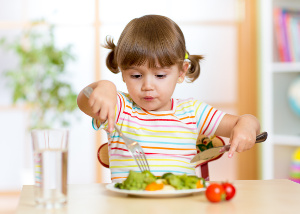Vegan diets affect the metabolism and need for several nutrients in children and young people
 Plant-based vegan diets have become increasingly popular among young adults and they even introduce these diets to their children. It is common knowledge that vegan diets lack vitamin B12, which is why many vegans take a supplement. However, a sizeable number of vegans also lack iodine, iron, zinc, and selenium. Most studies have looked at adults but it appears that children on vegan diets also risk metabolic changes, and they have lower blood levels of vitamins A and D compared with children on normal diets. This was demonstrated in a new study that is published in the esteemed international science magazine, EMBO Molecular Medicine.
Plant-based vegan diets have become increasingly popular among young adults and they even introduce these diets to their children. It is common knowledge that vegan diets lack vitamin B12, which is why many vegans take a supplement. However, a sizeable number of vegans also lack iodine, iron, zinc, and selenium. Most studies have looked at adults but it appears that children on vegan diets also risk metabolic changes, and they have lower blood levels of vitamins A and D compared with children on normal diets. This was demonstrated in a new study that is published in the esteemed international science magazine, EMBO Molecular Medicine.
There can be a number of reasons for choosing to eat a vegan diet: Climate responsibility, ecology, ethics, and personal health. A vegan diet is a purely plant-based diet that it completely devoid of animal products, including eggs and dairy products. A purely vegan diet can easily result in deficiencies of several nutrients Therefore, health authorities recommend taking supplements of vitamin B12, vitamin D, and iodine. There may even be a need for extra calcium, vitamin B2, iron, and zinc.
The Finnish study reveals other deficiencies in children
In a new Finnish study from the University of Helsinki, 40 children followed a strictly vegan diet, a vegetarian diet, or at the same diet as the rest of their families. The study did not detect differences in their status of the above-mentioned nutrients, with the exception of vitamin D. All children eating vegan diets took regular supplements of vitamin B12, and everyone except for one participant took regular supplements of vitamin D and iodine. This is a sign that the Finnish families on vegan diets are familiar with the official recommendations.
Still, the recommendations are only based on studies of deficiencies in adult vegans. No studies have looked at how vegan diets affect the metabolism and nutrient status of children.
The new Finnish study shows that children on a strict vegan diet had significantly lower levels of vitamin D in their blood compared with children on normal diets. Vitamin D levels were also lower among vegan children even when they took supplements regularly. The blood samples were taken late in the summer.
The scientists were surprised to find that vegan children also had lower levels of vitamin A in their blood, and their levels of LDL and HDL cholesterol were also lower. Cholesterol is an essential compound that is found in all cell membranes and is involved in the synthesis of vitamin D and steroid hormones. Levels of amino acids, which are building blocks of protein, were also lower in vegan children. Last but not least, levels of DHA (docosahexaenoic acid), a type of omega-3 fatty acid, were also lower in vegan children. DHA plays a key role in vision and neural transmission.
On the other hand, vegan children had higher levels of folic acid that is important for the formation of red blood cells and for growth.
The Finnish scientists see their new discoveries as motivation to conduct even larger studies to uncover possible health consequences of a vegan diet in childhood. They also say that their observations do not necessarily apply to adult vegans. Moreover, the scientists say there should be a lot more focus on making sure that children on vegan diets get enough vitamin A, vitamin D, and protein from different sources. The study is published in EMBO Molecular Medicine.
Vegans should also make sure to get enough selenium
According to a German study, adult vegans often lack iodine and selenium, both nutrients of which are important for the body’s metabolism. Selenium is also important for the immune defense, fertility, cardiovascular system, and for preventing cancer.
The Finnish researchers point to other studies that reveal a widespread lack of selenium in Europe because of the nutrient-depleted soil, and they recommend selenium supplementation as a way to compensate for that.
The German study supports a study from the University of Copenhagen that compared Danish vegans in the age group 18-61 years with regular meat eaters. This study showed that vegans got too little protein, vitamin D, iodine, and selenium. Just for the record, the Finns introduced mandatory selenium enrichment of fertilizers in the mid-80s and have maintained that routine ever since which has helped optimize the population’s selenium status.
Facts about nutrients in vegetable and animal sources
|
References
Topi Hovinen et al. Vegan diet in young children remodels metabolism and challenges the status of essential nutrients. EMBO Molecular Medicine, 2021
University of Helsinki. Vegan diet significantly remodels metabolism in young children. ScienceDaily 2021
Weikert C et al. Vitamin and Mineral Status in a Vegan Diet. Deutsches Aerzteblatt Online. November, 2020
BfR Federal Institute for Risk Assessment. Veganism: Vitamin B 12 is well supplemented, iodine is a matter of concern. ScienceDaily November 10, 2020
Ulla Gjeset Schølberg. Veganere mangler vitaminer og mineraler. Videnskab.dk 2016
Search for more information...
- Created on .








